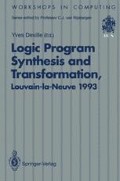Abstract
We present a new transformation of Prolog programs preserving operational equivalence. Our transformation — EBC (equality based continuation) transformation — relies on the introduction of equations between terms. These equations are used to introduce alternative and more efficient representations of terms. When applied to binary Prolog programs, EBC is able to perform the following optimizations by mere source to source transformations: removal of existential variables in programs using difference lists and accumulators, reduction of the number of occur-checks, interprocedural register allocation when executed on the WAM, linearization of recursions, optimization of continuation-like user data structures.
Access this chapter
Tax calculation will be finalised at checkout
Purchases are for personal use only
Preview
Unable to display preview. Download preview PDF.
References
A. Appel. Compiling with Continuations. Cambridge University Press, 1992. ISBN 0–521–41695–7.
F. Baader and J. Siekmann. Unification theory. In D. Gabbay, C. Hogger, and J. Robinson, editors, Handbook of Logic in Artificial Intelligence and Logic Programming. Oxford University Press, Oxford, UK, 1993. To appear.
J. Beer. The occur-check problem revisited. The Journal of Logic Programming, 5 (3): 243–262, September 1988.
J. Beer. Concepts, Design, and Performance Analysis of a Parallel Prolog Machine, volume 404 of Lecture Notes in Computer Science. Springer-Verlag, 1989.
J.-L. Bouquard. Etude des rapports entre Grammaire Attribuées et Programmation Logique: Application au test d’occurrence et à l’analyse statique. PhD thesis, Université d’Orleans, 1992.
R. Burstall and J. Darlington. A transformation system for developing recursive programs. Journal of the ACM, 24: 44–67, 1977.
B. Demoen. On the transformation of a Prolog program to a more efficient binary program. Technical Report 130, K.U.Leuven Department of Computer Science, revised version LOPSTR92, 1992.
P. Deransart and J. Maluszynski. Relating logic programs and attribute grammars. Journal of Logic Programming, 2 (2): 119–155, 1985.
J. Gallager and M. Bruynooghe. Some low-level source transformations for logic programs. In M. Bruynooghe, editor, Proceedings of the Second Workshop on Meta-programming in Logic, pages 229–244. K.U. Leuven, Department of Computer Science, Apr. 1990.
J. V. Guttag and J. J. Horning. The algebraic specification of abstract data types. Acta Informatica, 10: 27–52, 1978.
G. Hamilton and S. Jones. Compile-time garbage collection by necessity analysis. In S. P. Jones, G. Hutton, and C. Holst, editors, Functional Programming, Glasgow 1990, pages 66–70. Springer-Verlag, London, 1991.
C. Julié and D. Parigot. Space optimization in the FNC-2 attribute grammar system. In P. Deransart and M. Jourdan, editors, Attribute Grammars and their Applications (WAGA), volume 461 of Lecture Notes in Computer Science, pages 29–45. Springer-Verlag, Sept. 1990.
U. Kastens and M. Schmidt. Lifetime analysis for procedure parameters. In B. Robinet and R. Wilhelm, editors, Proceedings of the 1st European Symposium on Programming (ESOP ‘86), volume 213 of Lecture Notes in Computer Science, pages 53–69. Springer-Verlag, Mar. 1986.
F. Kluiniak. Compile time garbage collection for Ground Prolog. In R. A. Kowalski and K. A. Bowen, editors, Proceedings of the Fifth International Conference and Symposium on Logic Programming, pages 1490–1505, Seatle, 1988. ALP, IEEE, The MIT Press.
S. Le Huitouze, P. Louvet, and O. Ridoux. Logic grammars and λ-Prolog. In D. Warren, editor, Proceedings of the Tenth International Conference on Logic Programming, pages 64–79, Budapest, Hungary, 1993. The MIT Press.
J. Lloyd and J. Shepherdson. Partial evaluation in logic programming. Journal of Logic Programming, 11: 217–242, 1991.
M. Meier. Recursion vs. iteration in Prolog. In K. Furukawa, editor, Proceedings of the Eighth International Conference on Logic Programming, pages 157–169, Paris, France, 1991. The MIT Press.
A. Mulkers, W. Winsborough, and M. Bruynooghe. Analysis of shared data structures for compile-time garbage. In D. H. D. Warren and P. Szeredi, editors, Proceedings of the Seventh International Conference on Logic Programming, pages 747–762, Jerusalem, 1990. The MIT Press.
U. Neumerkel. Specialization of Prolog programs with partially static goals and binarization, Dissertation. Bericht TR 1851–1992–12, Institut für Computersprachen, Technische Universität Wien, 1992.
U. Neumerkel. Une transformation de programme basée sur la notion d’équations entre termes. In Secondes journées francophones sur la programmation en logique (JFPL’98), Nimes-Avingnon, France, 1993.
M. Proietti and A. Pettorossi. Unfolding-definition-folding in this order, for avoiding unnecessary variables in logic programs. In J. Maluszynski and M. Wirsing, editors, Programming Languages Implementation and Logic Programming, volume 528 of Lecture Notes in Computer Science, pages 347–358, Passau, Germany, Aug. 1991. Springer-Verlag.
P. V. Roy. A useful extension to Prolog’s Definite Clause Grammar notation. SIGPLAN notices, 24 (11): 132–134, Nov. 1989.
T. Sato and H. Tarnaki. Existential continuation. New Generation Computing, 6 (4): 421–438, 1989.
H. Tamaki and T. Sato. Unfold/fold transformation of logic programs. In S.-A. Tärnlund, editor, Second International Logic Programming Conference, pages 127–138, Uppsala, 1984.
P. Tarau and M. Boyer. Elementary logic programs. In P. Deransart and J. Maluszynski, editors, Programming Languages Implementation and Logic Programming, volume 456 of Lecture Notes in Computer Science, pages 159–173, Linköping, Sweden, Aug. 1990. Springer-Verlag.
M. Wand. Continuation-based program transformation strategies. Journal of the Association for Computing Machinery, 27 (1): 164–180, 1980.
Author information
Authors and Affiliations
Editor information
Editors and Affiliations
Rights and permissions
Copyright information
© 1994 British Computer Society
About this paper
Cite this paper
Neumerkel, U. (1994). A Transformation Based on the Equality between Terms. In: Deville, Y. (eds) Logic Program Synthesis and Transformation. Workshops in Computing. Springer, London. https://doi.org/10.1007/978-1-4471-3234-9_15
Download citation
DOI: https://doi.org/10.1007/978-1-4471-3234-9_15
Publisher Name: Springer, London
Print ISBN: 978-3-540-19864-2
Online ISBN: 978-1-4471-3234-9
eBook Packages: Springer Book Archive

